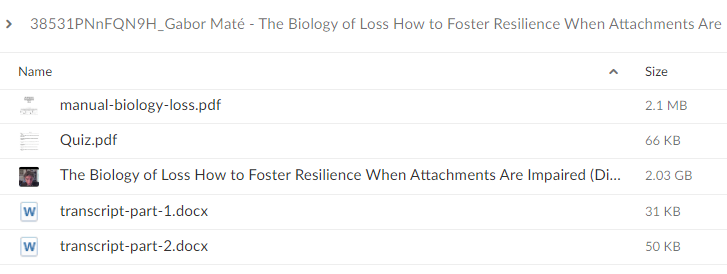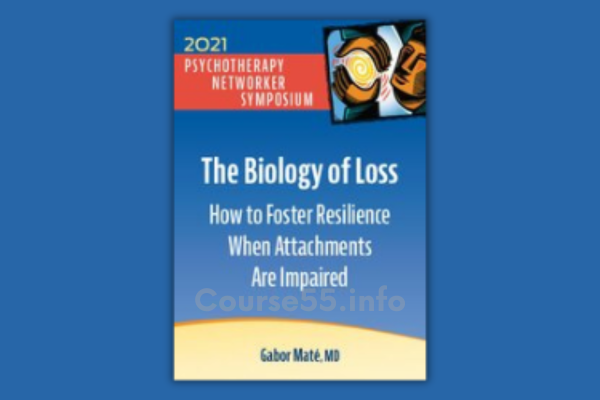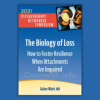The Biology of Loss How to Foster Resilience When Attachments Are Impaired (Digital Seminar) By Gabor Maté
$119.00 Original price was: $119.00.$23.10Current price is: $23.10.
The Biology of Loss: Fostering Resilience in the Face of Impaired Attachments – Immediate Download!
Let See The Content Inside This Course:

Description:
The issue of emotional well-being has never been more urgent in the fast-paced world of today. In his educational online webinar, renowned physician and best-selling book Dr. Gabor Maté discusses this important topic. The workshop, titled “The Biology of Loss: How to Foster Resilience When Attachments Are Impaired,” provides a thorough examination of the effects of trauma and attachment loss on social interactions and personal growth.
Key takeaways from Dr. Maté’s talk will be discussed in this article, along with a sophisticated understanding of emotional resilience and therapeutic frameworks that can help individuals and professionals dealing with these emotional difficulties. We can better prepare ourselves and others to handle the challenges of our emotional life if we comprehend the intricate relationship between attachment and resilience.

Understanding Attachment Loss
Attachment serves as a foundation for psychological growth by fostering emotional security in people. However, the consequences of breaking these important ties can be felt in all facets of a person’s life. According to Dr. Maté, losing important bonds, especially throughout childhood, can have serious emotional and psychological effects. A number of things, including abuse, neglect, or simply upheavals in the family, may have contributed to the loss.
There are many different ways that attachment loss can have psychological effects. For example, later in life, people may have increased anxiety, depression, or even behavioral problems. This can be demonstrated using the metaphor of a tree: a child who lacks stable bonds lacks the fundamental resilience to face life’s challenges, just as a tree without strong roots cannot survive storms. Similar to how wind erodes a once-strong tree’s bark, every loss experience erodes one’s emotional fortitude.
Dr. Maté examines the neurological components of attachment and their connection to emotional control in his presentation. According to scientific study, attachment disorders can change brain development, especially in regions linked to stress response, in addition to having an effect on psychological well-being. By comprehending these biological foundations, mental health professionals can address the underlying causes of emotional distress in addition to its manifestations.
Key Factors Contributing to Attachment Loss:
- Parental Absence: Frequent or prolonged absence leads to feelings of abandonment.
- Emotional Unavailability: If caregivers are emotionally distant, children may develop insecure attachment styles.
- Traumatic Events: Experiences of trauma can disrupt the normal attachment processes, leading to complex emotional struggles.
Tackling the issue of attachment loss is paramount. Dr. Maté’s insights are not merely academic but deeply humanistic, inviting participants to reframe their perspectives on trauma not as a permanent affliction but as a challenge that can foster growth and resilience. The seminar encourages individuals to reflect on their attachment histories and consider how these experiences shape their current relationships and self-perceptions.
The Nature of Resilience
Many people believe that resilience is an innate trait that some people have while others have not. Dr. Maté, however, disputes this idea, asserting that resilience is a skill that can be developed, especially within the context of therapeutic procedures. Therefore, cultivating resilience is similar to strengthening muscles; it calls for repetition, comprehension, and deliberate interaction with both past traumas and current events.
The idea of mindfulness, a method that helps people become more conscious of their emotional states without passing judgment, is one of the key concepts that are covered. People can use the power of self-compassion and address feelings of trauma and loss by interacting with present-moment events. This well-rounded strategy creates an atmosphere that supports resilience.
Take a look at the following metaphor to demonstrate this process: Think of resilience like a muscle that requires work to get stronger. That muscle may weaken if we solely use our emotional reactions in emergency situations. On the other hand, people may guarantee that this crucial muscle stays strong and prepared to face obstacles by actively engaging in mindfulness and self-reflection on a daily basis.
Strategies for Fostering Resilience:
- Mindfulness Training: Engaging in practices such as meditation or deep-breathing exercises.
- Therapeutic Journaling: Writing about feelings and experiences to foster self-awareness.
- Building Support Networks: Establishing connections with individuals who promote emotional well-being.
- Seeking Professional Help: Consulting psychotherapists or counselors who specialize in trauma and attachment.
Dr. Maté emphasizes the vitality of recognizing our emotional vulnerabilities and understanding the nature of trauma. Resilience isn’t about denying pain or hardship; it’s about acknowledging these feelings and working through them constructively. This perspective not only serves as a foundation for personal healing but also encourages professionals in the mental health field to adopt compassionate approaches toward their clients.
Therapeutic Approaches to Healing
A greater comprehension of resilience and connection loss necessitates the use of efficient treatment techniques. According to Dr. Maté, healing is more about fostering an environment that supports growth than it is about solving an issue. This can be accomplished via a range of techniques intended to treat trauma’s emotional and psychological components.
Trauma-informed care is one important approach covered in the conference, which highlights the necessity for professionals to comprehend the pervasive effects of trauma and possible recovery routes. Instead of pathologizing people, the goal is to view them as resilient individuals with potential capabilities. People can process their experiences without worrying about being judged because to this framework, which establishes a safe environment for healing.
Dr. Maté also encourages the use of somatic techniques into therapeutic approaches. These include acknowledging that trauma affects both mental and physical health and establishing a connection between the mind and body. To assist clients in reestablishing a connection with their bodies and letting go of pent-up emotions, methods like yoga, body awareness training, and even expressive arts might be employed.
Key Components of Effective Therapeutic Approaches:
- Empathetic Listening: Creating a safe space for clients to share their stories without fear of judgment.
- Emotional Regulation Techniques: Teaching clients strategies to manage overwhelming emotions.
- Mind-Body Integration: Encouraging practices that foster awareness of physical sensations connected to emotions.
- Community Support: Fostering connection through group therapies or peer support networks.
The seminar offers a wealth of knowledge for mental health professionals, helping them understand how to integrate these practices into their work. By adopting a trauma-informed lens, practitioners can facilitate healing in a more profound, empathetic way, thereby promoting resilience and empowerment in those they serve.
Conclusion
“The Biology of Loss: How to Foster Resilience When Attachments are Impaired,” a digital seminar by Dr. Gabor Maté, is a useful tool for anybody attempting to understand the intricate relationship between attachment, trauma, and resilience. Dr. Maté offers insightful information that can revolutionize both individual healing processes and professional therapeutic approaches by fusing science and empathy.
People might reframe their stories when they realize that attachment loss is not a sign of failure but rather a chance for personal development. Developing resilience, accepting vulnerability, and establishing caring relationships are not merely aspirations; they are attainable realities. With the correct resources and understanding, we may successfully negotiate the rocky terrain of trauma and come out stronger, opening the door to more wholesome relationships and emotional stability.
Frequently Requested Enquiries:
Innovation in Business Models: We employ a group buying strategy that allows customers to divide costs and receive a lower rate for popular courses. Despite content providers’ concerns about distribution tactics, this approach benefits low-income individuals.
Legal Aspects: The legality of our conduct raises a number of complex issues. Although we do not have the course developer’s official permission to redistribute their content, there are no clear resale restrictions stated at the time of purchase. We have the opportunity to provide affordable educational resources because of this uncertainty.
Quality Control: We ensure that all of the course materials we purchase are identical to those supplied by the writers. However, it is important to understand that we are not approved vendors. Consequently, our products don’t include:
– In-person consultations or phone conversations with the course developer for advice.
– Access to sites or organizations that are exclusive to authors.
– Engaging in private forums.
– Simple email support from the author or their team.
By offering these courses independently, without the premium services of the official channels, we hope to reduce the barrier to education. We appreciate your understanding of our unique approach.
Be the first to review “The Biology of Loss How to Foster Resilience When Attachments Are Impaired (Digital Seminar) By Gabor Maté” Cancel reply
You must be logged in to post a review.

















Reviews
There are no reviews yet.